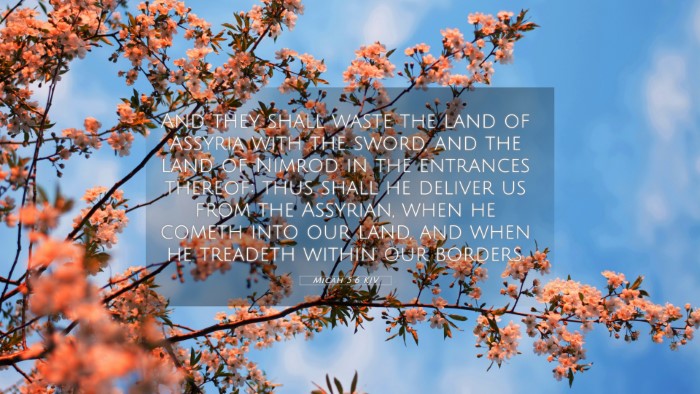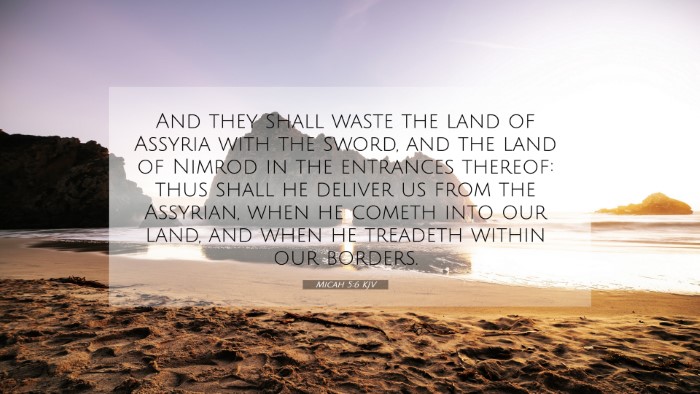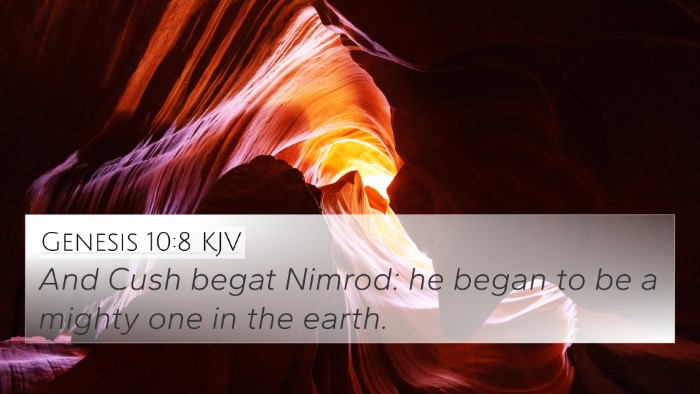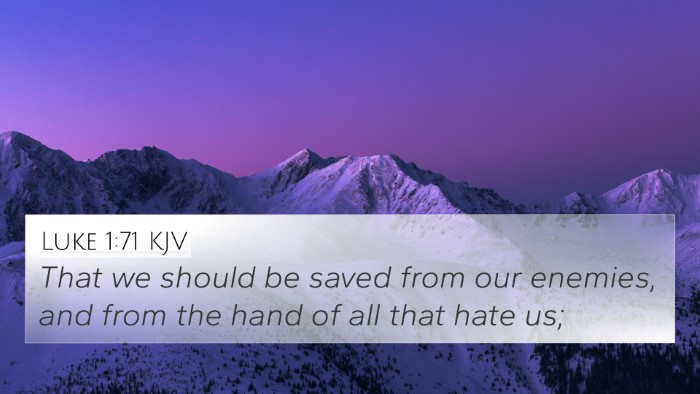Old Testament
Genesis Exodus Leviticus Numbers Deuteronomy Joshua Judges Ruth 1 Samuel 2 Samuel 1 Kings 2 Kings 1 Chronicles 2 Chronicles Ezra Nehemiah Esther Job Psalms Proverbs Ecclesiastes Song of Solomon Isaiah Jeremiah Lamentations Ezekiel Daniel Hosea Joel Amos Obadiah Jonah Micah Nahum Habakkuk Zephaniah Haggai Zechariah MalachiMicah 5:6 Similar Verses
Micah 5:6 Cross References
And they shall waste the land of Assyria with the sword, and the land of Nimrod in the entrances thereof: thus shall he deliver us from the Assyrian, when he cometh into our land, and when he treadeth within our borders.
Uncover the Rich Themes and Topics of This Bible Verse
Listed below are the Bible themes associated with Micah 5:6. We invite you to explore each theme to gain deeper insights into the Scriptures.
Micah 5:6 Cross Reference Verses
This section features a detailed cross-reference designed to enrich your understanding of the Scriptures. Below, you will find carefully selected verses that echo the themes and teachings related to Micah 5:6 KJV. Click on any image to explore detailed analyses of related Bible verses and uncover deeper theological insights.
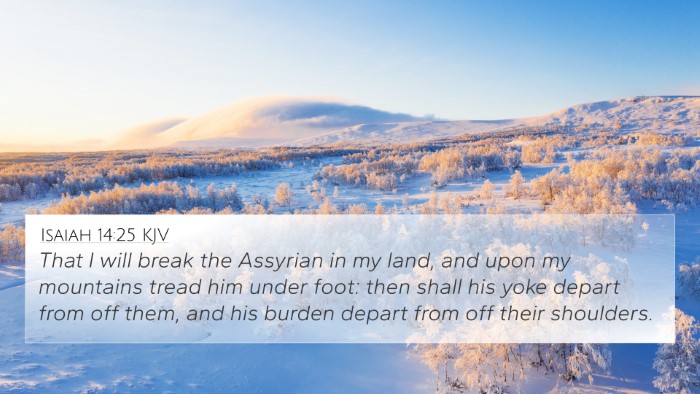
Isaiah 14:25 (KJV) »
That I will break the Assyrian in my land, and upon my mountains tread him under foot: then shall his yoke depart from off them, and his burden depart from off their shoulders.

Luke 1:74 (KJV) »
That he would grant unto us, that we being delivered out of the hand of our enemies might serve him without fear,
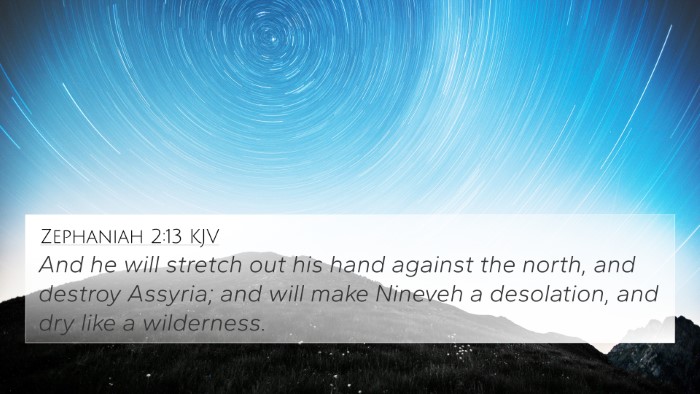
Zephaniah 2:13 (KJV) »
And he will stretch out his hand against the north, and destroy Assyria; and will make Nineveh a desolation, and dry like a wilderness.

Nahum 2:11 (KJV) »
Where is the dwelling of the lions, and the feedingplace of the young lions, where the lion, even the old lion, walked, and the lion's whelp, and none made them afraid?
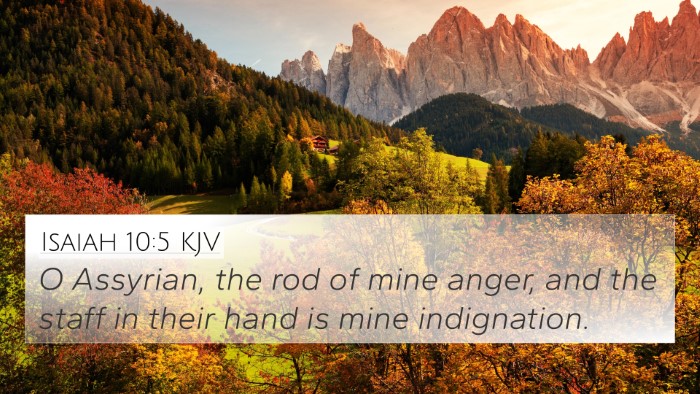
Isaiah 10:5 (KJV) »
O Assyrian, the rod of mine anger, and the staff in their hand is mine indignation.
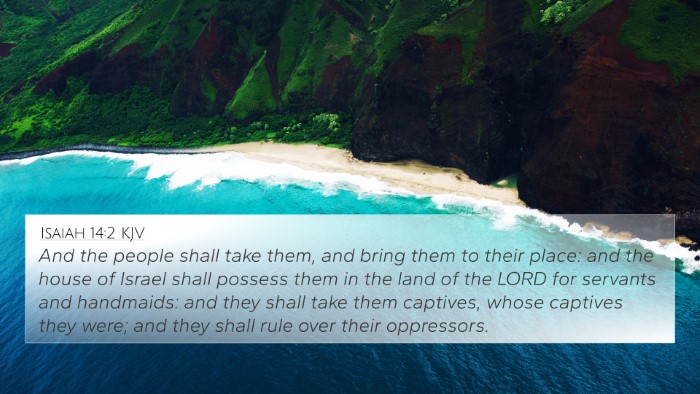
Isaiah 14:2 (KJV) »
And the people shall take them, and bring them to their place: and the house of Israel shall possess them in the land of the LORD for servants and handmaids: and they shall take them captives, whose captives they were; and they shall rule over their oppressors.
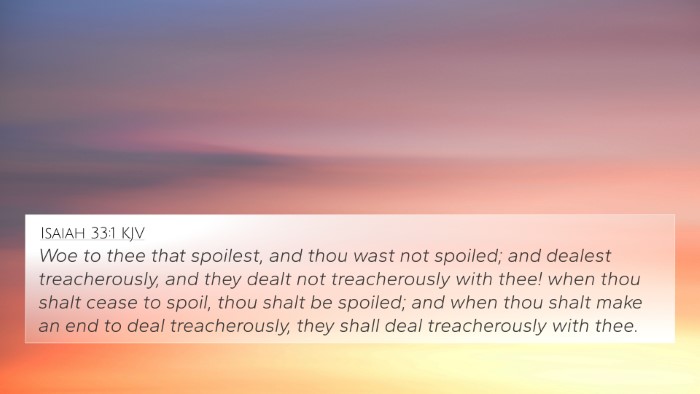
Isaiah 33:1 (KJV) »
Woe to thee that spoilest, and thou wast not spoiled; and dealest treacherously, and they dealt not treacherously with thee! when thou shalt cease to spoil, thou shalt be spoiled; and when thou shalt make an end to deal treacherously, they shall deal treacherously with thee.
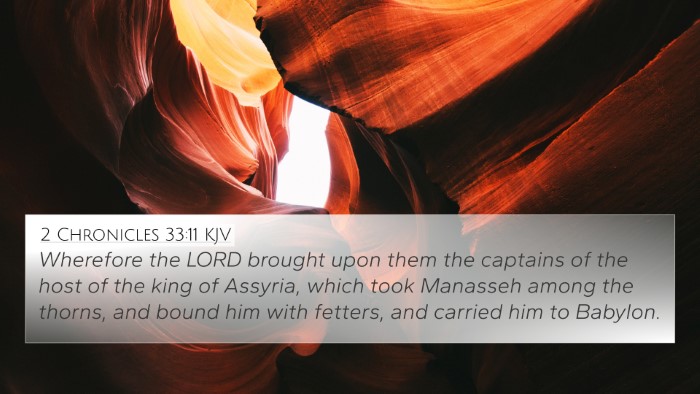
2 Chronicles 33:11 (KJV) »
Wherefore the LORD brought upon them the captains of the host of the king of Assyria, which took Manasseh among the thorns, and bound him with fetters, and carried him to Babylon.
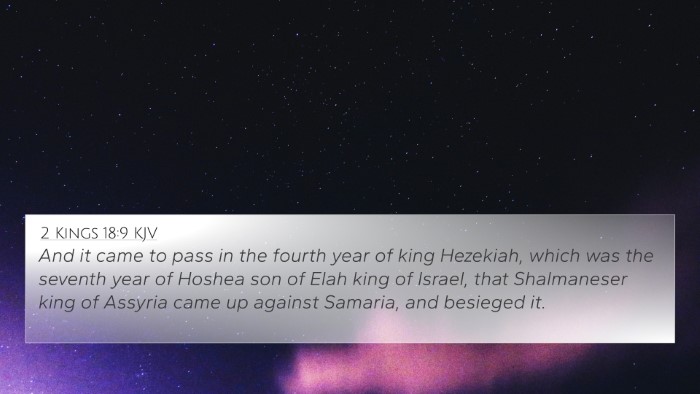
2 Kings 18:9 (KJV) »
And it came to pass in the fourth year of king Hezekiah, which was the seventh year of Hoshea son of Elah king of Israel, that Shalmaneser king of Assyria came up against Samaria, and besieged it.
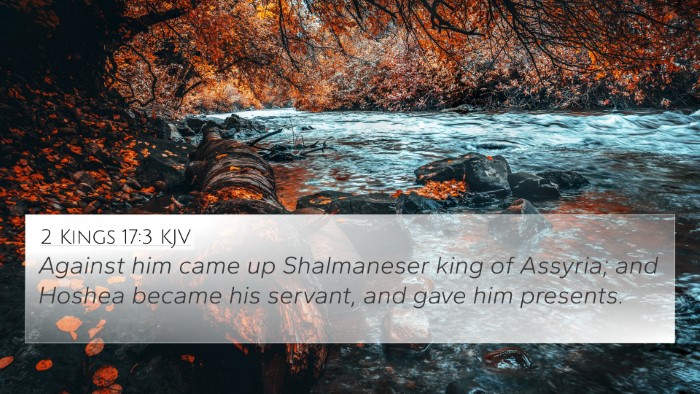
2 Kings 17:3 (KJV) »
Against him came up Shalmaneser king of Assyria; and Hoshea became his servant, and gave him presents.
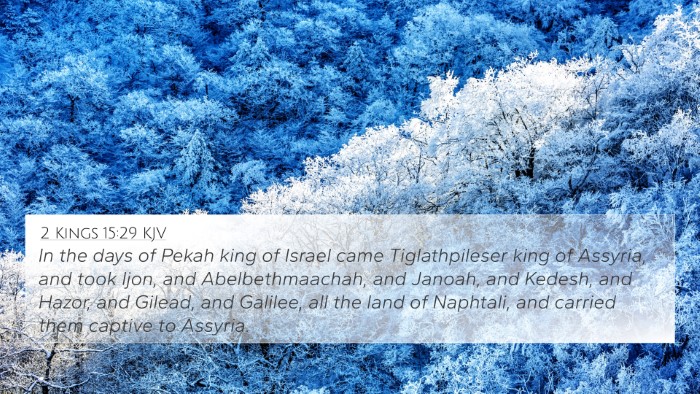
2 Kings 15:29 (KJV) »
In the days of Pekah king of Israel came Tiglathpileser king of Assyria, and took Ijon, and Abelbethmaachah, and Janoah, and Kedesh, and Hazor, and Gilead, and Galilee, all the land of Naphtali, and carried them captive to Assyria.
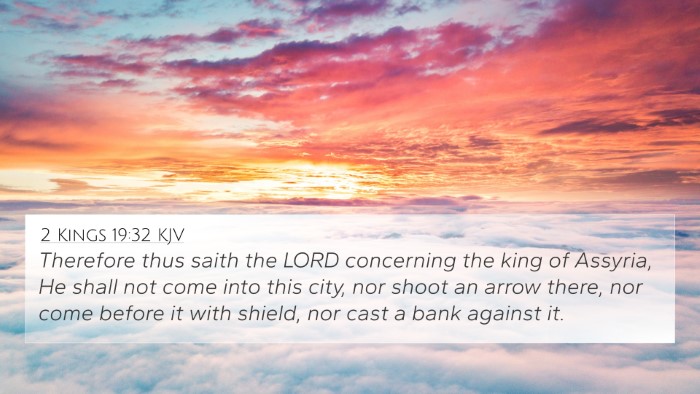
2 Kings 19:32 (KJV) »
Therefore thus saith the LORD concerning the king of Assyria, He shall not come into this city, nor shoot an arrow there, nor come before it with shield, nor cast a bank against it.
Micah 5:6 Verse Analysis and Similar Verses
Understanding Micah 5:6
Micah 5:6: "And they shall waste the land of Assyria with the sword, and the land of Nimrod in the entrances thereof: thus shall he deliver us from the Assyrian, when he cometh into our land, and when he treadeth within our borders."
This verse speaks to God's promise of deliverance for His people from the oppressive forces surrounding them, particularly highlighted in the contexts of Assyria and Nimrod. Below, we explore the meaning and implications of this verse through various commentaries and reflections.
Commentary Insights
-
Matthew Henry:
Henry emphasizes God's sovereignty and power over nations. The mention of Assyria and Nimrod reflects the historical oppression faced by Israel. He notes that God's deliverance is a theme that underlines His faithfulness to His covenant people, assuring them that their circumstances will not prevail against His plan.
-
Albert Barnes:
Barnes interprets this verse as a prophetic announcement of judgment against the Assyrians, demonstrating God's control over geopolitical dynamics. He sees a parallel in God's past deliverances, likening it to His actions during the Exodus. The reference to "Nimrod" symbolizes idolatry and rebellion against God, which He will ultimately vanquish.
-
Adam Clarke:
Clarke points out that the "sword" signifies divine judgment that will befall Assyria. He also notes that the historical context provides a backdrop to understanding future prophetic fulfillments. Clarke stresses that these events serve as ultimate reminders of hope and redemption for a beleaguered Israel.
Thematic Connections
Micah 5:6 contains thematic elements central to biblical faith, including:
- Divine Deliverance: God's promise to deliver His people from their enemies.
- Judgment: The assured judgment against oppressors, illustrating God’s justice.
- Faithfulness: God’s unwavering commitment to His covenant and people.
Cross-References
There are several verses throughout the Bible that relate to Micah 5:6, providing a richer understanding through cross-referencing:
- Isaiah 10:24-25: Discusses God's judgment against Assyria.
- Jeremiah 50:17: A prophecy regarding the judgment of Babylon, akin to Assyria’s impending doom.
- Zephaniah 3:15: God’s removal of judgment against His people and their subsequent rejoicing.
- Romans 8:31: Reinforces that if God is for us, who can be against us?
- Psalms 46:1: God as our refuge and strength, highlighting His protective nature.
- Revelation 19:11-21: Portrays the ultimate victory of Christ over all nations.
- Acts 4:24-30: The early church appeals for boldness and acknowledges God's sovereignty over the nations.
Conclusion
Micah 5:6 invites readers to reflect on God’s sovereign control and His role as a deliverer of His people. By cross-referencing with other scriptures, we notice a coherent theme running through the Bible: God’s commitment to justice, faithfulness, and eventual deliverance from oppressors, which resounds not only in the Old Testament but is echoed throughout the New Testament.
Furthermore, these connections enable a deeper investigation into God's nature and His promises, enriching our understanding through comparative Bible verse analysis. For anyone seeking tools for Bible cross-referencing or looking to identify connections between varied scriptures, such profound links provide a broader context to support personal faith and communal teachings.
How to Use Cross-References
Engaging with cross-references enriches one's study of the scriptures. Here are practical steps for utilizing these resources:
- Use a bible concordance to find terms and themes across different books.
- Explore a bible cross-reference guide to identify thematic connections.
- Join cross-reference bible study groups to discuss insights and interpretations.
- Consider utilizing online bible reference resources for broader access to related scriptures.
- Keep a journal of bible chain references that personally resonate with your studies.

